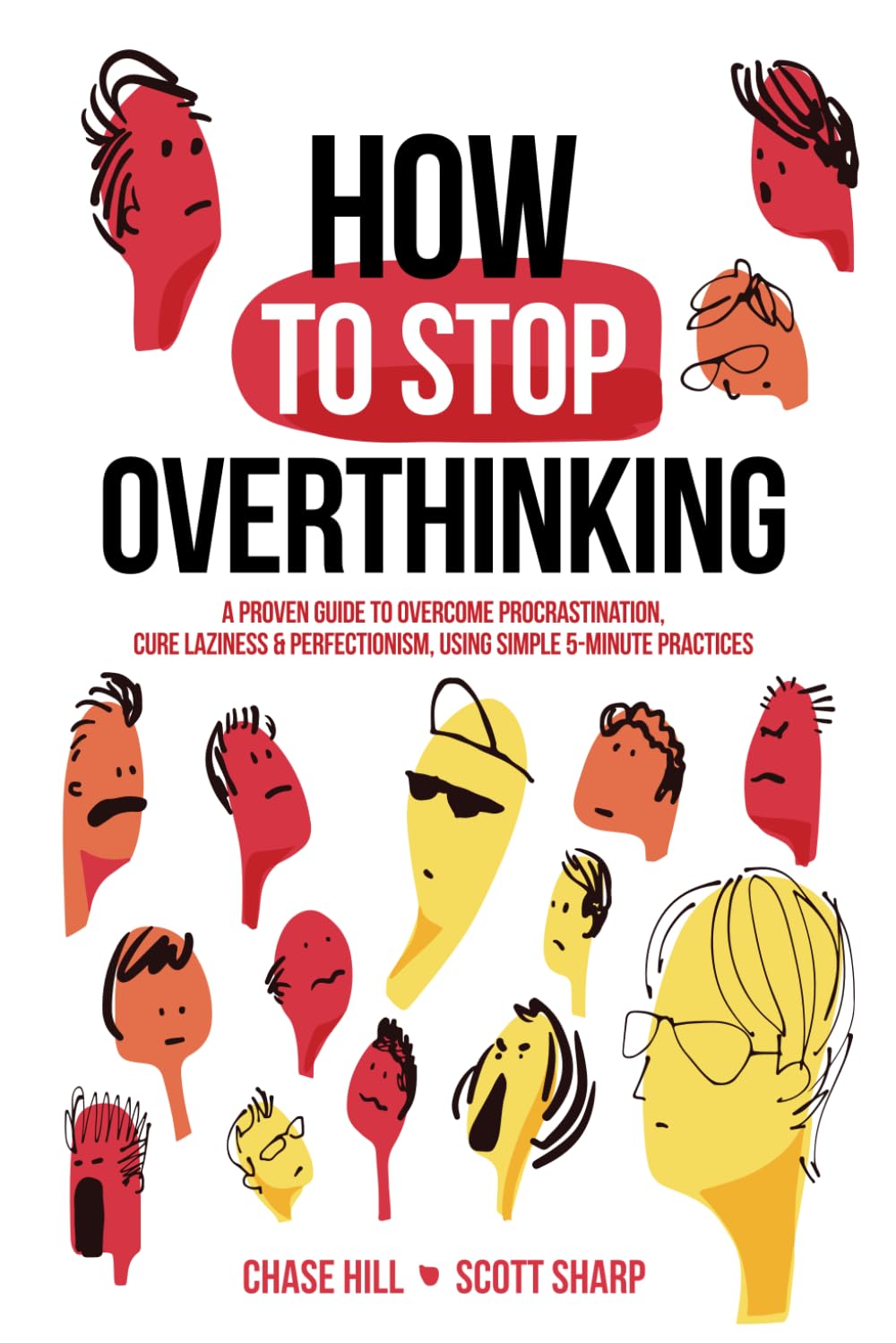Table of Contents
Introduction
In today’s fast-paced world, the constant stream of thoughts in our minds can either be a source of enlightenment or a burden that weighs us down. This article delves deep into the intricate relationship between overthinking and mental health, shedding light on how this double-edged sword can shape our well-being.
What Is Overthinking?
Overthinking, as the term suggests, is the process of thinking excessively or obsessively about something. It’s when your mind becomes trapped in a loop of repetitive thoughts, often revolving around a particular problem, situation, or concern. While thinking is a natural and essential function of the human mind, overthinking takes it to an extreme level.
Key Characteristics of Overthinking:
- Repetitive Thoughts: Overthinking involves dwelling on the same thoughts repeatedly, without reaching a resolution.
- Worry and Anxiety: It often leads to heightened worry, anxiety, or stress, as overthinkers tend to focus on potential negative outcomes.
- Perfectionism: Overthinkers may have perfectionistic tendencies, always striving for the ideal solution or outcome.
- Difficulty in Decision-Making: Making even small decisions can become challenging for those prone to overthinking, as they tend to weigh all options extensively.
- Analysis Paralysis: Overthinking can lead to “analysis paralysis,” where individuals are unable to make decisions or take action due to excessive contemplation.
- Physical Symptoms: Prolonged overthinking can manifest in physical symptoms like headaches, muscle tension, and sleep disturbances.
Why Do We Overthink?
Overthinking can stem from various sources, including:
- Perfectionism: Striving for perfection can lead to overthinking, as individuals constantly seek the best possible outcome.
- Fear of Failure: A fear of making mistakes or experiencing failure can drive overthinking as people try to avoid potential pitfalls.
- Anxiety and Stress: High levels of stress and anxiety can trigger overthinking as the mind races to find solutions or explanations.
- Lack of Control: Feeling out of control in a situation may lead to overthinking as individuals try to regain a sense of control through excessive analysis.
- Past Trauma: Past experiences, especially negative ones, can contribute to overthinking as people try to prevent similar situations from occurring.

Managing Overthinking
While overthinking is a common human experience, it can become problematic when it negatively impacts your mental health and daily life. Learning to manage overthinking involves recognizing the signs, challenging irrational thoughts, and developing coping strategies.
In the labyrinth of our thoughts, overthinking can indeed be a double-edged sword. By acknowledging its potential to affect our mental health, we empower ourselves to take control. This article has explored the links between overthinking and mental health, provided coping strategies, and emphasized the importance of balance.
Remember, understanding and managing overthinking is a journey. Seek support from professionals or share your experiences with others on this path to mental well-being. In the end, the power to turn this double-edged sword into a valuable tool rests in your hands.
In upcoming sections, we’ll explore effective techniques to help you stop overthinking and regain control over your thoughts and emotions.
The Pros and Cons of Overthinking
Is overthinking a helpful problem-solving tool or an exhausting mental burden? Let’s delve into the pros and cons of overthinking to gain a better understanding of this complex phenomenon.
The Pros:
- Thorough Problem-Solving:One of the advantages of overthinking is that it can lead to thorough problem-solving. When you meticulously analyze a situation, you’re more likely to consider all angles and potential solutions.
- Enhanced Creativity:Overthinking can stimulate your creativity. It encourages you to explore different perspectives and possibilities, which can be a valuable asset in creative endeavors, such as writing, art, or innovation.
- Heightened Preparedness:Overthinking can make you more prepared for various scenarios. It prompts you to anticipate challenges and devise contingency plans, which can be beneficial in certain situations.
The Cons:
- Increased Anxiety and Stress:Overthinking is often associated with increased levels of anxiety and stress. Ruminating on negative thoughts and worst-case scenarios can take a toll on your mental and emotional well-being.
- Impaired Decision-Making:Paralysis by analysis is a common outcome of overthinking. When you obsessively weigh every option, it can become challenging to make decisions, leading to procrastination and missed opportunities.
- Disturbed Sleep Patterns:Overthinking, particularly at night, can disrupt your sleep patterns. Racing thoughts can make it difficult to fall asleep or stay asleep, resulting in fatigue and decreased overall health.
- Strained Relationships:Overthinking can negatively impact your relationships. Constantly analyzing interactions and overinterpreting signals can lead to misunderstandings and unnecessary conflicts.
Balancing Act
So, is overthinking a blessing or a curse? The answer lies in finding a balance. Recognize the situations where overthinking can be an asset, such as when problem-solving or unleashing creativity. However, be mindful of its potential drawbacks, like heightened stress and impaired decision-making.
Learning to manage overthinking is key. Techniques like mindfulness, setting boundaries, and seeking support can help you harness the benefits of deep thinking while minimizing its negative effects. Ultimately, it’s about making overthinking a tool that serves you rather than a burden that weighs you down.
Do you find yourself lying awake at night because you can’t stop worrying about what happened today? Are you constantly second-guessing almost every decision that you are faced with in life? Do your job, friendships or whole life seem to be overwhelming?
By reading this book, you’ll discover how to deal with your fears, overcome negative thoughts, relieve stress, and stop your overthinking for good.
The Link Between Overthinking and Mental Health
Our minds are incredible machines that are capable of profound insights and creative leaps. However, when overthinking takes the reins, it can lead to a cascade of negative effects on our mental health. The link between overthinking and mental health is undeniable; what we think can significantly impact how we feel.
- Anxiety and Stress:The relentless cycle of overanalysing situations and possible outcomes can give birth to anxiety and stress. Our minds become battlegrounds of hypothetical scenarios, leading to a constant state of worry.To address this, it’s essential to practice mindfulness and stay rooted in the present moment.
- Depression and Isolation:Overthinking can lead to rumination, which often spirals into feelings of sadness and hopelessness. As we dwell on perceived mistakes or regrets, we may withdraw from social interactions, deepening our sense of isolation.Cognitive Behavioral Therapy (CBT) can be a lifeline for individuals struggling with this aspect of overthinking.
- Sleep Disturbances:The mind that never rests can disrupt our sleep patterns, causing insomnia and fatigue. A lack of quality sleep further exacerbates mental health challenges.Setting boundaries and creating a bedtime routine can aid in getting a restful night’s sleep.
Coping Strategies for Overthinkers
While overthinking can be overwhelming, it’s essential to remember that there are strategies to cope with its effects:
- Mindfulness and Meditation:By practicing mindfulness and meditation, individuals can learn to observe their thoughts without judgment. This empowers them to detach from overthinking patterns.Encourage readers to start with short daily sessions and gradually increase their duration.
- Cognitive Behavioral Therapy (CBT):CBT is a proven therapeutic approach to address overthinking and its impact on mental health. It equips individuals with practical tools to challenge and reframe negative thought patterns.Explain the basic principles of CBT and suggest seeking professional help for a tailored treatment plan.
- Setting Boundaries:Establishing boundaries around the time and mental energy allocated to specific thoughts can prevent overthinking from taking over one’s life.Provide tips on setting limits, such as designating “thinking time” during the day.
Finding Balance
Overthinking isn’t inherently negative. In controlled doses, it can be a source of creativity, problem-solving, and self-reflection. The key is to strike a balance between thoughtfulness and stress.
- Encourage readers to recognize the moments when overthinking serves as an asset, such as in creative endeavors or complex problem-solving.
- Highlight the importance of mindfulness in managing when and how much to engage in deep thinking.
Additional Tips for Managing Overthinking
- Journaling:Encourage readers to keep a journal where they can jot down their thoughts and feelings. This practice can help externalize thoughts, making them easier to analyze and manage.Suggest journal prompts for self-reflection and emotional release.
- Physical Activity:Regular exercise is a powerful tool for managing overthinking. Physical activity releases endorphins, which are natural mood lifters, and it can help break the cycle of rumination.Recommend various forms of exercise suitable for different fitness levels.
- Connect with a Support System:Sometimes, talking to a trusted friend, family member, or therapist can provide valuable insights and emotional relief. Encourage readers to reach out when they feel overwhelmed.Offer guidance on how to initiate conversations about overthinking with loved ones.
- Limit Information Overload:In our information-driven age, it’s easy to become inundated with data. Suggest that readers consciously limit their exposure to news and social media to prevent overthinking triggered by information overload.Provide tips on creating a balanced media consumption routine.
Embracing Overthinking as a Tool
While it’s crucial to manage the negative aspects of overthinking, it’s equally important to recognize its potential benefits:
- Creative Thinking:Overthinking can fuel creativity and innovation. Encourage readers to embrace their deep-thinking moments as opportunities for inspiration.
- Problem-Solving:In complex situations, overthinking can lead to more thorough problem-solving. Discuss examples where overthinking has led to positive outcomes.
- Self-Reflection:Overthinking allows individuals to delve deeper into their thoughts and feelings, aiding in self-discovery and personal growth.
So, How To Stop Overthinking
Overthinking can be like a never-ending carousel of thoughts, looping around your mind and leaving you feeling stuck and anxious. The good news is that you can learn to step off that carousel and regain control over your thoughts.
You may not see your overthinking as a curse or it has more Pros than Cons in which case you may not wish to control or stop your overthinking. For me it does (or did) have its uses. But in a recent relationship, I found it to be an absolute Curse.
Here are some simple strategies to help you stop overthinking:
1. Recognise When It’s Happening
The first step in overcoming overthinking is to recognise when it’s happening. Pay attention to the signs – if you find yourself obsessing over a problem or situation, replaying conversations in your head, or worrying excessively about the future, you’re likely overthinking.
2. Challenge Negative Thoughts
Once you’ve identified that you’re overthinking, challenge those negative thoughts. Ask yourself if your worries are based on facts or if they are just your mind playing tricks on you. Often, overthinking involves imagining the worst-case scenario, which is usually unlikely to happen.
3. Set Aside “Worry Time”
Allocate a specific time in your day for worrying. During this designated “worry time,” allow yourself to think about your concerns, write them down, or talk about them. When the time is up, consciously shift your focus away from worrying until the next designated time.
4. Practice Mindfulness
Mindfulness involves staying in the present moment, which can help break the cycle of overthinking. Try deep breathing exercises, meditation, or simply focusing on your senses – what you can see, hear, smell, taste, and touch right now.
5. Keep Busy
Overthinking often occurs when you have too much free time on your hands. Keep yourself occupied with activities you enjoy, whether it’s a hobby, exercise, or spending time with loved ones. When your mind is engaged, it’s less likely to wander into overthinking territory. You’ll find me in-front of the computer (like right now) writing or creating something. It helps keep the mind busy and if I have to feel I have achieved something useful each day.
6. Learn Problem-Solving Skills
If your overthinking revolves around real-life problems, work on improving your problem-solving skills. Break the problem down into manageable steps and focus on finding solutions rather than dwelling on the issue.
7. Talk to Someone
Don’t keep your worries bottled up. Share your thoughts and concerns with a trusted friend, family member, or therapist. Sometimes, talking things out can provide a fresh perspective and alleviate overthinking.
8. Practice Self-Compassion
Be kind to yourself. Understand that everyone overthinks from time to time, and it’s a normal human experience. Treat yourself with the same kindness and understanding you would offer to a friend.
9. Limit Information Intake
In the age of information overload, it’s easy to get lost in a sea of news and social media. Set boundaries on the amount of information you consume to prevent unnecessary overthinking triggered by external sources.
10. Seek Professional Help
If overthinking is significantly impacting your daily life, consider seeking support from a mental health professional. They can provide you with tailored strategies and tools to manage overthinking effectively.
Remember, stopping overthinking is a gradual process, and it may take time to see significant changes. Be patient with yourself and stay committed to practicing these techniques. With persistence and self-compassion, you can regain control over your thoughts and enjoy a more peaceful and balanced mind.
OverPowering OverThinking
Overthinking and mental health are intrinsically linked, but by employing coping strategies and embracing the positive aspects of deep thinking, individuals can harness this double-edged sword for their benefit. Remember, it’s a journey, and there’s no one-size-fits-all solution. Seek the support and guidance you need, and you’ll find a path towards a healthier balance between analytical thinking and mental well-being.
Seeking Professional Help
In some cases, managing overthinking and its impact on mental health may require professional intervention. It’s essential to emphasize that seeking help is a sign of strength, not weakness.
- Encourage readers to consult a mental health professional if overthinking is significantly affecting their daily life, relationships, or overall well-being.
- Provide information on how to find a therapist or counselor, highlighting the various therapy options available, including individual therapy, group therapy, and online counseling.
Supporting Loved Ones
If readers are not personally dealing with overthinking but know someone who is, it’s essential to offer support and understanding.
- Offer tips on how to approach and communicate with someone struggling with overthinking without judgment or criticism.
- Stress the importance of empathy and active listening in helping a loved one cope.
Overthinking and its impact on mental health are complex and multifaceted. This article has provided insights into the link between the two, coping strategies, and the potential benefits of controlled overthinking.
Do you find yourself lying awake at night because you can’t stop worrying about what happened today? Are you constantly second-guessing almost every decision that you are faced with in life? Do your job, friendships or whole life seem to be overwhelming?
By reading this book, you’ll discover how to deal with your fears, overcome negative thoughts, relieve stress, and stop your overthinking for good.
Closing Thoughts
Remember that everyone’s journey is unique, and it’s okay to seek help and support along the way. By understanding the nuances of overthinking and its relationship with mental health, individuals can take proactive steps toward a healthier and more balanced mindset.
In the end, overthinking can indeed be a double-edged sword, but with knowledge, self-awareness, and the right resources, it can be transformed into a tool for personal growth and well-being.
Stay Connected:
We’re here for you every step of the way. Whether you have questions, breakthroughs to share, or stories of your own, we welcome you to stay connected with us.
Join our community, reach out, and let us celebrate your victories and support your challenges.
Affiliate Declaration
This post contains affiliate links. If you click on one of these links and make a purchase, I may receive a commission. You may also benefit from some links as you may receive a discount or free trial on some links.



